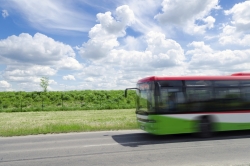Preparing for a Zero Emission Urban Bus System
In order to create a competitive and sustainable transport system, the EU must look to alternative fuels to replace or complement petrol and diesel. Not only will this reduce transport emissions but it will also improve air quality and noise levels in urban areas. With this in mind, the ZEEUS (‘Zero Emission Urban Bus System’) project is working to make electric buses a core part of the urban bus network. Just one year after its launch, the ZEEUS project team has already begun testing electrification solutions for buses through live demonstrations. In mid October Barcelona hosted the launch of the first ZEEUS core demonstration which culminated in a short ride through the streets the city accompanied by Barcelona mayor, Xavier Trias. Local Spanish operator TMB (Transports Metropolitans de Barcelona) will now test four full electric buses: two standard i2e 12m IRIZAR buses and two 18m articulated SOLARIS buses. IRIZAR buses will charge at the depot, while the SOLARIS buses will charge at the end stations via opportunity charging. Barcelona is just one of eight such tests for the ZEEUS project, which runs until April 2017. The team is testing a wide range of different innovative electric bus technologies and charging infrastructure solutions in seven other demonstration sites – Bonn, Cagliari, Glasgow, London, Munster, Pilsen and Stockholm. The different sites will offer varying operational conditions to test the economic, environmental and social viability of the technologies in diverse locations. In late September, ZEEUS presented the first battery-powered electric bus Škoda Perun in Pilsen, although it is not in operation yet. And in spring 2015, the city will welcome two full electric, emission-free and quiet buses. These vehicles have a unique cooling and heating system that can re-use the heat generated during operation. Moreover, their battery can be fully recharged in as little as 12 minutes. Meanwhile, this week, the city of Stockholm is preparing to showcase its Volvo 12m plug-in hybrid buses to the citizens, city officials and local stakeholders. The Swedish capital will test eight plug-in hybrid buses with fast charging along route 73 in the city centre. Umberto Guida, ZEEUS project coordinator, notes, ‘Bus fleets have been a testing ground for alternative fuels and engines for many years, but today 95 % of all buses still use fossil fuels. With this project we are well on the way to greener and smarter transport systems for our cities and electric vehicles will play a critical role in cleaning our air, making our towns and cities quieter and more enjoyable places to live and work.’ ZEEUS comprises 40 partners including public transport authorities, public transport operators, industry and vehicle manufacturers, energy providers, universities and research centres, engineering firms, consultancies and associations. Between them, they cover the entire stakeholder spectrum of key actors and decision makers who will facilitate the process of extending the electric solution to the core urban bus network. Although its first focus are these eight European cities, the ZEEUS team wants to get a broad picture of electric bus deployment around Europe and beyond. That’s why UITP, coordinator of the project, is operating an Electric Bus Observatory which will closely monitor electric bus deployment worldwide and publish all collected information and data. Electric bus demonstrations and pilots funded by other European and National programmes can get involved and apply to become an ‘Observed Demonstration’ (http://zeeus.eu/news/call-for-observed-demonstrations). Selected observed demos will attend periodic meetings where they will discuss concerns and issues, providing key input to some core ZEEUS outputs, namely the ZEEUS Electrification Roadmap. The deadline for applying to become an Observed Demonstration is 31 October 2014. For more information, please visit: http://zeeus.eu/
Countries
Belgium



